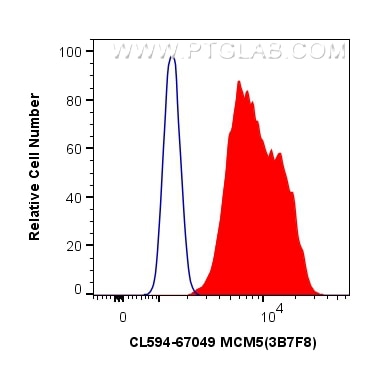Anticorps Monoclonal anti-MCM5
MCM5 Monoclonal Antibody for FC (Intra)
Hôte / Isotype
Mouse / IgG1
Réactivité testée
Humain
Applications
FC (Intra)
Conjugaison
CoraLite®594 Fluorescent Dye
CloneNo.
3B7F8
N° de cat : CL594-67049
Synonymes
Galerie de données de validation
Applications testées
| Résultats positifs en FC (Intra) | cellules MCF-7 |
| Résultats positifs en cytométrie | cellules MCF-7 |
Dilution recommandée
| Application | Dilution |
|---|---|
| Flow Cytometry (FC) (INTRA) | FC (INTRA) : 0.40 ug per 10^6 cells in a 100 µl suspension |
| Flow Cytometry (FC) | FC : 0.40 ug per 10^6 cells in a 100 µl suspension |
| It is recommended that this reagent should be titrated in each testing system to obtain optimal results. | |
| Sample-dependent, check data in validation data gallery | |
Informations sur le produit
CL594-67049 cible MCM5 dans les applications de FC (Intra) et montre une réactivité avec des échantillons Humain
| Réactivité | Humain |
| Hôte / Isotype | Mouse / IgG1 |
| Clonalité | Monoclonal |
| Type | Anticorps |
| Immunogène | MCM5 Protéine recombinante Ag28704 |
| Nom complet | minichromosome maintenance complex component 5 |
| Masse moléculaire calculée | 82 kDa |
| Poids moléculaire observé | 82-88 kDa |
| Numéro d’acquisition GenBank | BC000142 |
| Symbole du gène | MCM5 |
| Identification du gène (NCBI) | 4174 |
| Conjugaison | CoraLite®594 Fluorescent Dye |
| Excitation/Emission maxima wavelengths | 588 nm / 604 nm |
| Forme | Liquide |
| Méthode de purification | Purification par protéine G |
| Tampon de stockage | PBS with 50% glycerol, 0.05% Proclin300, 0.5% BSA |
| Conditions de stockage | Stocker à -20 °C. Éviter toute exposition à la lumière. Stable pendant un an après l'expédition. L'aliquotage n'est pas nécessaire pour le stockage à -20oC Les 20ul contiennent 0,1% de BSA. |
Informations générales
Minichromosome maintenance, S. Cerevisiae, homolog of 5(MCM5), one component of the complex of MCM2-7, which is the putative replicative essential for once per cell cycle DNA replication initiation and elongation in eukaryotic cells. The MCM complex form a hexameric ring through the interaction surfaces of two neighboring subunits.
Protocole
| Product Specific Protocols | |
|---|---|
| FC protocol for CL594 MCM5 antibody CL594-67049 | Download protocol |
| Standard Protocols | |
|---|---|
| Click here to view our Standard Protocols |


